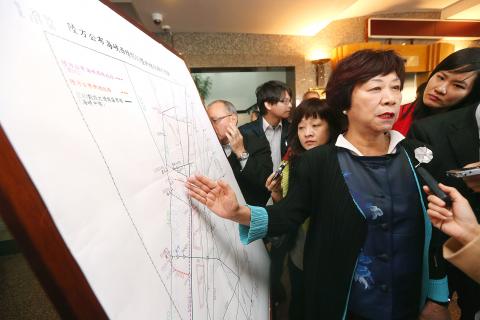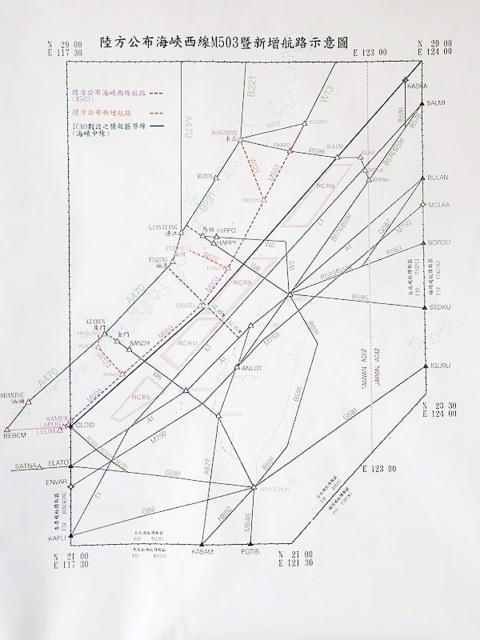A unilateral decision by China to establish new aviation routes near the midline of the Taiwan Strait without further negotiations with Taipei was “unacceptable,” the Civil Aeronautics Administration (CAA) said yesterday, adding that it would seek to communicate with the Chinese government on related safety issues in the months to come.
CAA Director-General Jean Shen (沈啟) said that Beijing announced an updated aviation safety bulletin on Monday morning which included four new air routes near China’s southeast coast. Among them, a route labeled M503 is nearly parallel to the middle line of the Taiwan Strait, coming as close to the line as 7.8km.
Additionally, three more routes — W121, W122 and W123 — were established as feeder routes for M503, she said.

Photo: CNA
“The air route W122 would affect Taiwanese air routes W8 and W2, which are used by Taiwanese flights to the outlying islands of Matsu,” Shen said. “The W123 route, on the other hand, is close to Taiwanese route W6, which is used by flights to Kinmen.”
Shen said that Beijing intended to use the M503 route to ease the load on its southeast coast route, which connects Shanghai, Fuzhou, Xiamen, Shenzhen, Zhuhai, Guanzhou and Hong Kong.
She said that both sides had had only “informal discussions” about creating such a route, including addressing the potential deviation of air routes due to inclement weather conditions, air traffic control issues and adjusted aircraft altitudes.

Photo courtesy of the Civil Aeronautics Administration
However, the two sides have not reached consensus on any one of these issues, she said.
The three feeder routes further surprised the administration, as Beijing had not mentioned anything about them previously, she said.
“Based on the spirit of the international civil aviation agreement, any member of the International Civil Aviation Organization should engage in negotiations in advance if any of its new air routes would affect the flight information regions [FIR] nearby,” Shen said. “We find China’s unilateral decision to establish these routes unacceptable. China should continue its communication with us, following the spirit of the international civil aviation agreement.”
Shen said China is scheduled to start using these routes at midnight on March 5, adding that it had indicated that the flights would operate along a buffer zone that is about 7.4km west of M503 when the route goes into service.
However, she said that M503 falls within the Shanghai FIR, which is very close to the Taipei FIR and has to accommodate many international flights.
In light of potential aviation safety concerns that the new route could engender, Shen said the CAA would communicate the technical issues to China.
CAA air traffic control department director Lee Jian-kuo (李建國) said that determining how far west of M503 the CAA would want the routes to move requires further talks with China, adding that the agency wants the buffer zone to be “as large as possible.”
Also, the Ministry of National Defense said that military air patrols would not be changed by China’s flight route plans, adding that patrols of Taiwan’s airspace will be increased, if necessary.
The military conducts airborne patrols throughout the nation’s airspace and these will not be affected by China’s route proposals, the ministry said in a statement.
Questioned about national security concerns, the ministry said that it will continue to monitor aircraft near the median line of the Taiwan Strait and increase air patrols if necessary.
In accordance with the principles of “No fear, no evasion and no showing of weakness,” the ministry said it would monitor, intercept or expel aircraft entering Taiwanese airspace without prior notification.

SECURITY: As China is ‘reshaping’ Hong Kong’s population, Taiwan must raise the eligibility threshold for applications from Hong Kongers, Chiu Chui-cheng said When Hong Kong and Macau citizens apply for residency in Taiwan, it would be under a new category that includes a “national security observation period,” Mainland Affairs Council (MAC) Minister Chiu Chui-cheng (邱垂正) said yesterday. President William Lai (賴清德) on March 13 announced 17 strategies to counter China’s aggression toward Taiwan, including incorporating national security considerations into the review process for residency applications from Hong Kong and Macau citizens. The situation in Hong Kong is constantly changing, Chiu said to media yesterday on the sidelines of the Taipei Technology Run hosted by the Taipei Neihu Technology Park Development Association. With

A US Marine Corps regiment equipped with Naval Strike Missiles (NSM) is set to participate in the upcoming Balikatan 25 exercise in the Luzon Strait, marking the system’s first-ever deployment in the Philippines. US and Philippine officials have separately confirmed that the Navy Marine Expeditionary Ship Interdiction System (NMESIS) — the mobile launch platform for the Naval Strike Missile — would take part in the joint exercise. The missiles are being deployed to “a strategic first island chain chokepoint” in the waters between Taiwan proper and the Philippines, US-based Naval News reported. “The Luzon Strait and Bashi Channel represent a critical access

CARROT AND STICK: While unrelenting in its military threats, China attracted nearly 40,000 Taiwanese to over 400 business events last year Nearly 40,000 Taiwanese last year joined industry events in China, such as conferences and trade fairs, supported by the Chinese government, a study showed yesterday, as Beijing ramps up a charm offensive toward Taipei alongside military pressure. China has long taken a carrot-and-stick approach to Taiwan, threatening it with the prospect of military action while reaching out to those it believes are amenable to Beijing’s point of view. Taiwanese security officials are wary of what they see as Beijing’s influence campaigns to sway public opinion after Taipei and Beijing gradually resumed travel links halted by the COVID-19 pandemic, but the scale of

Pope Francis is be laid to rest on Saturday after lying in state for three days in St Peter’s Basilica, where the faithful are expected to flock to pay their respects to history’s first Latin American pontiff. The cardinals met yesterday in the Vatican’s synod hall to chart the next steps before a conclave begins to choose Francis’ successor, as condolences poured in from around the world. According to current norms, the conclave must begin between May 5 and 10. The cardinals set the funeral for Saturday at 10am in St Peter’s Square, to be celebrated by the dean of the College